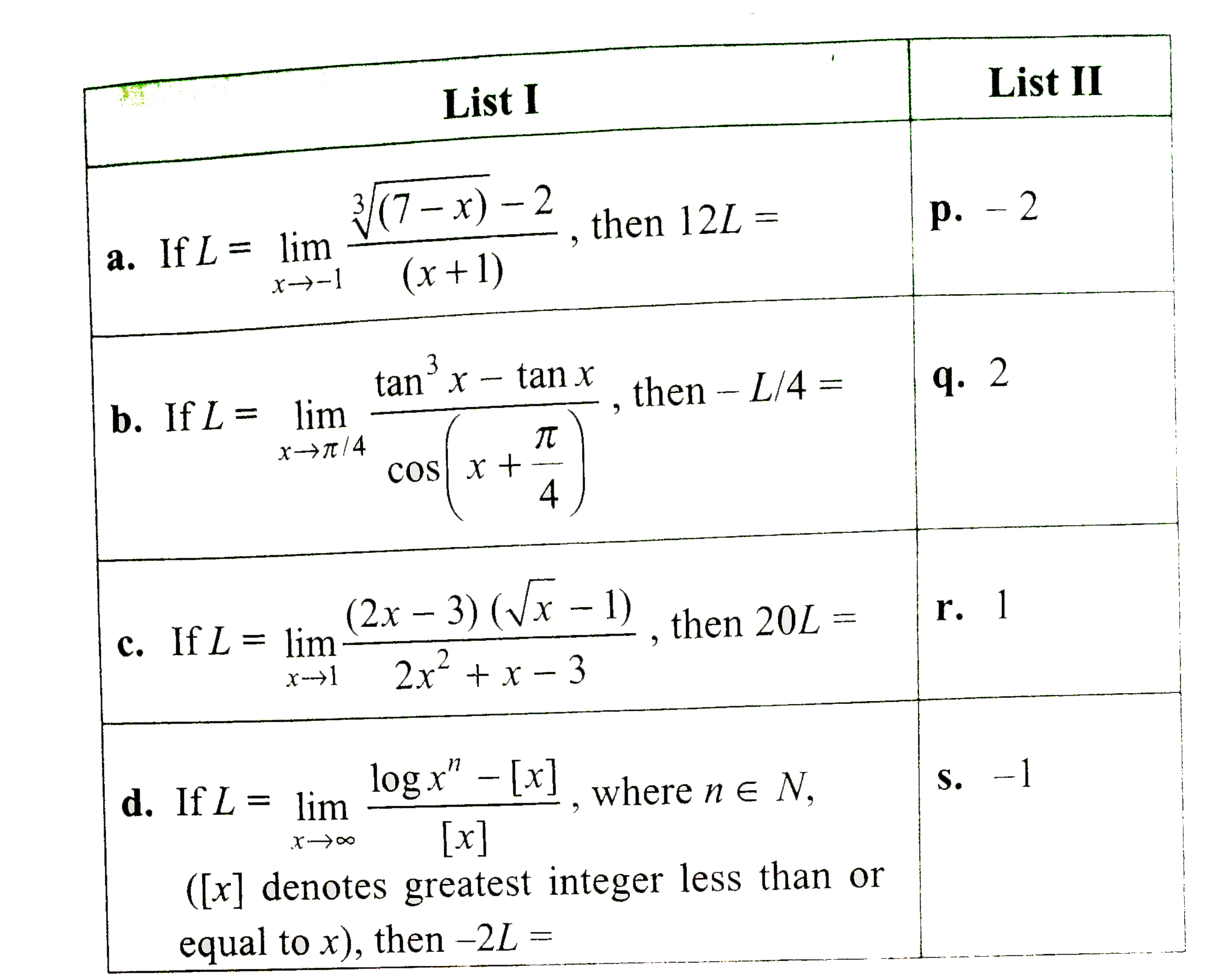(lim)x→∞(an−1+n21+n)=b, where a is a finite number, then(a) a=1 (b) a=0 (c) b=1 (d) b=−1Solution in Tamil
f(0)=1
f(π2)=1
f(a)=(cosa)cos2a.(sina)sin2a if a∈(0,π2)
f(a)=(sina)sin2a(cosa)cos2a if a∈(0,π2)
The correct Answer is:A, C
Limit=limn→∞an(1+n)−(1+n2)1+n=limn→∞(a−1)n2+an−1n+1
If a−1=0, limit =limn→∞an−1n+1=a=b
∴a=b=1
Topper's Solved these Questions
- BOOK - CENGAGECHAPTER - LIMITSEXERCISE - Exercise (Comprehension)20videos
LIMITS
- BOOK - CENGAGECHAPTER - LIMITSEXERCISE - Exercise (Matrix)5videos
LIMITS
- BOOK - CENGAGECHAPTER - LIMITSEXERCISE - Exercise (Single)76videos
LIMITS
- BOOK - CENGAGECHAPTER - JEE 2019EXERCISE - Chapter 109videos
JEE 2019
- BOOK - CENGAGECHAPTER - LINEAR COMBINATION OF VECTORS, DEPENDENT AND INDEPENDENT VECTORSEXERCISE - DPP 1.210videos
LINEAR COMBINATION OF VECTORS, DEPENDENT AND INDEPENDENT VECTORS
Similar Questions
Find the domain of f(x)=√|x|−{x} (where {⋅} denots the fractional part of x).
04:11View SolutionMatch the following lists:
 03:16View Solution
03:16View Solution(lim)x→0[sin(sgn(x))(sgn(x))], where[.] denotes the greatest integer function, is equal to (a)0 (b) 1 (c) −1 (d) does not exist
09:08View SolutionIf y = y(x) is the solution of the differential equation, xdydx+2y=x2 satisfying y(1) = 1, then y(12) is equal to
05:23View SolutionThe number of integral values of p for which (p+1)ˆi−3ˆj+pˆk,pˆi+(p+1)ˆj−3ˆk and −3ˆi+pˆj+(p+1)ˆk are linearly dependent vectors is q
04:18View Solutiont g(x) n.r is a finite 2m lim (1ogn (n)log, (n +1) log, (n +2) og (nk)) is equal to (a)n (b)K (c) o (d)none of these 28) lim cot (r2 is (a)o (b) tan 1 (c) tan (d)none of these then 2911 lim 1+
06:47View Solution(lim)x→∞(an−1+n21+n)=b, where a is a finite number, then a=1 (b) a=0 (c) b=1 (d) b=−1
03:01View SolutionIf A=[1a01] , then An (where n∈N) equals [1na01] (b) [1n2a01] (c) [1na00] (d) [nna0n]
05:14View Solutionlimn→∞1+a+a2+.....+an−11+b+b2+...+bn−1=0 if
04:05View Solutionयदि limn→∞(an−1+n21+n)=b हो (जहाँ a परिमित संख्या है ),तो
01:42View SolutionIf (lim)x→0{(a−n)nx−tanx}sinnxx2=0, where n is nonzero real number, the a is 0 (b) n+1n (c) n (d) n+1n
01:27View Solution(lim)n→∞(an−1+n21+n)=b, where a is a finite number, then a=1 (b) a=0 (c) b=1 (d) b=−1
03:32View SolutionLet A=[1011] . Then which of following is not true? (lim)n→∞1n2A−n=[00−10] b. (lim)n→∞1nA−n=[00−10] c. A−n=[10−n1]∀n≠N d. none of these
05:22View SolutionIf a>0,b>0 then (lim)n→∞(a−1+b1na)n= b1/a b. a1b c. ab d. ba
02:14View Solution(lim)n→∞n!(n+1)!+n! is equal to a. 1 b . 0 c. 2 d. 12
03:02View SolutionThe value of (lim)x→∞n!(n+1)!−(n)! is a. 1 b . -1 c. 0 d. none of these
04:18View Solution

